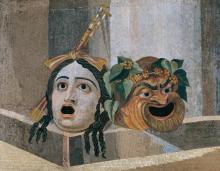Deborah Beck

Deborah Beck's PTF-supported podcast co-produced with her advanced ancient Greek students, "Musings in Greek Literature," released its most recent season in 2024. She has won various awards for teaching and research, including the 2021 Award for Excellence in the Teaching of Classics at the College and University Level from the Society for Classical Studies and a prize for Excellence in Faculty Teaching from the Gamma Sigma chapter of the national Classics undergraduate honors society Eta Sigma Phi (2019) as well as two Plumer Visiting Research Fellowships at St Anne’s College, Oxford (2017 and 2019). Her main research interest is ancient Greek and Roman epic poetry, especially Homer’s Iliad and Odyssey.
Initiative

Podcasting as Experiential Learning in Classics
Students in pre-modern disciplines face greater challenges in finding productive and engaging avenues for Experiential Learning than students in fields whose connections to current events are more self-evident. Podcasting offers students of ancient Greece and Rome a way to connect with people outside their classrooms, both other students and interested members of the general public. It also requires them to hone their oral presentation skills and to think about how to present the same idea to different audiences, both of which are fundamental to critical thinking.
Impacts

Musings in Greek Literature Podcast
"Musings in Greek Literature" is a podcast co-produced by Prof. Deborah Beck and advanced UT undergraduate students of ancient Greek. Episodes are available directly from UT's Liberal Arts Information Technology Services and also from Apple and Spotify.

Bearing and Sharing the Burdens of Mentoring in the COVID-19 Pandemic (TAPA)
PTF alum Deborah Beck authored this invited paper as part of a group of six articles on "rupture and repair" in the wake of the COVID-19 pandemic, which was published in Transactions of the American Philological Association, the journal of the professional organization for American Classicists. In the article, she explores the impacts of the COVID-19 pandemic's social isolation and "New Normal" on faculty peer mentorship and how the landscape of academic mentorship has changed since the onset of the pandemic.

A Classics Podcast Gets Greek Greats Onto Your Phone (Life & Letters Magazine)
This profile of PTF Deborah Beck's PTF Initiative, "Musings in Greek Literature," appeared in the Spring 2023 edition of Life and Letters, the magazine of the UT College of Liberal Arts.

The Odyssey (1997), with Deborah Beck (Movies We Dig Podcast)
Dr. Beck made a guest appearance on the Classics media podcast "Movies We Dig" due to her work with "Musings in Greek Literature." On this podcast, hosted by several young Classicists including two graduates of the UT Classics Ph.D. program, Beck discussed the made-for-TV version of Homer's Odyssey starring Armand Assante and Isabelle Rosselini (1997).

Podcasting, Performance, and Pedagogy (Sententiae Antiquae)
PTF Deborah Beck and her PTF Initiative were featured as a guest post of Sententiae Antiquae, a scholarly Classics blog with over 27,000 readers.
In the post Beck describes some of the reasons for and benefits of using podcasting as a tool for learning in Classics courses:

